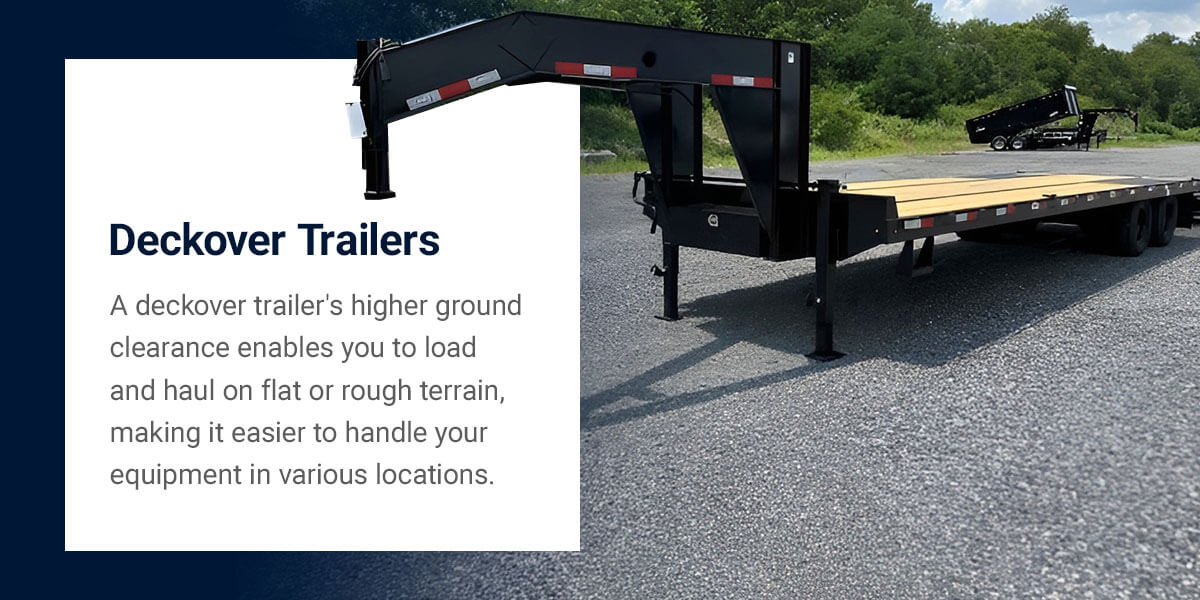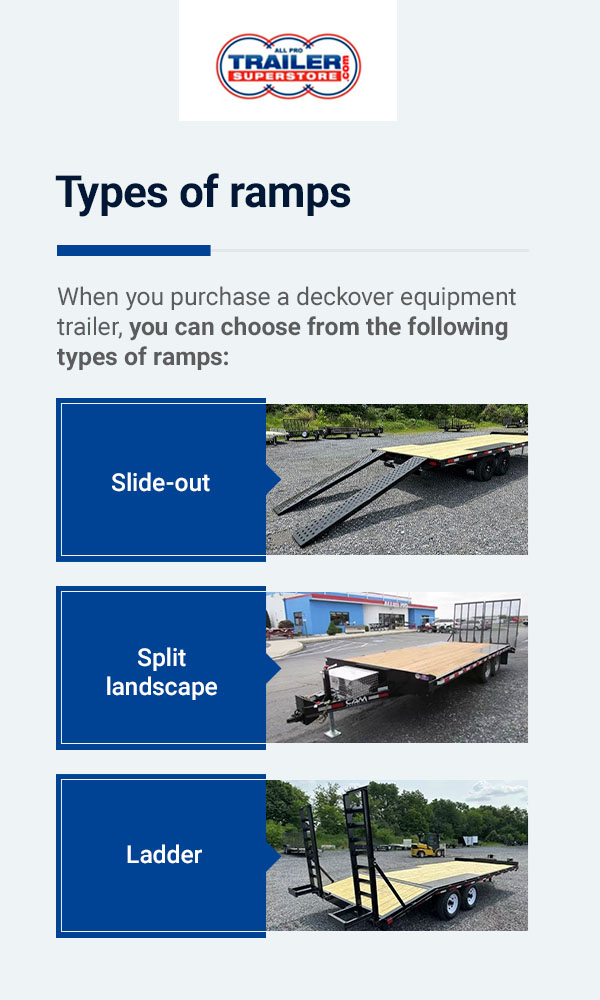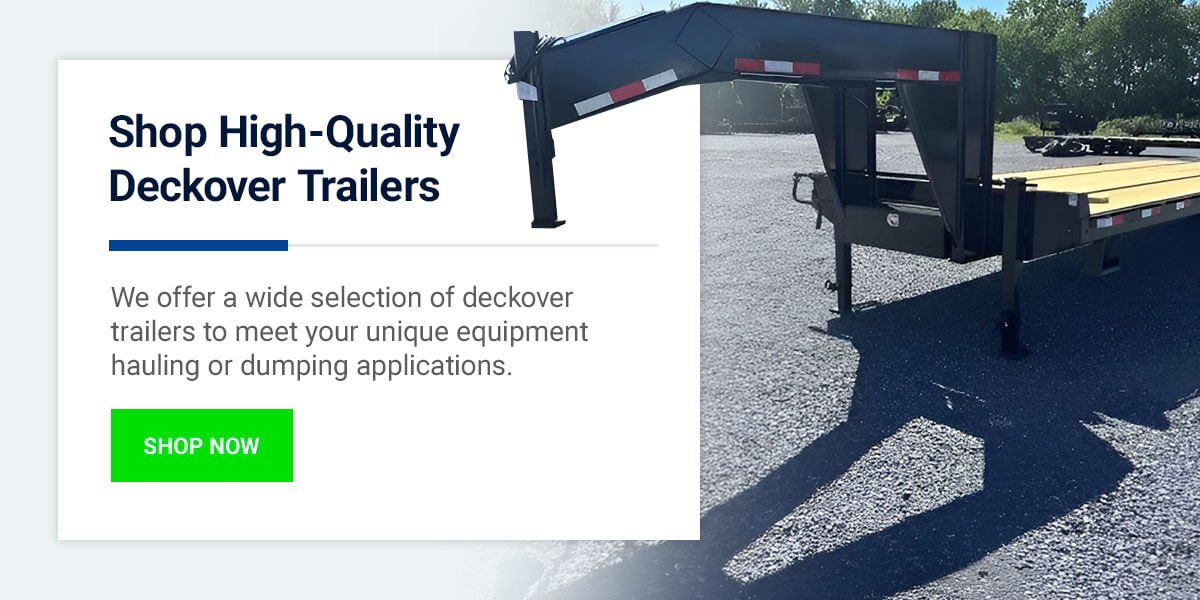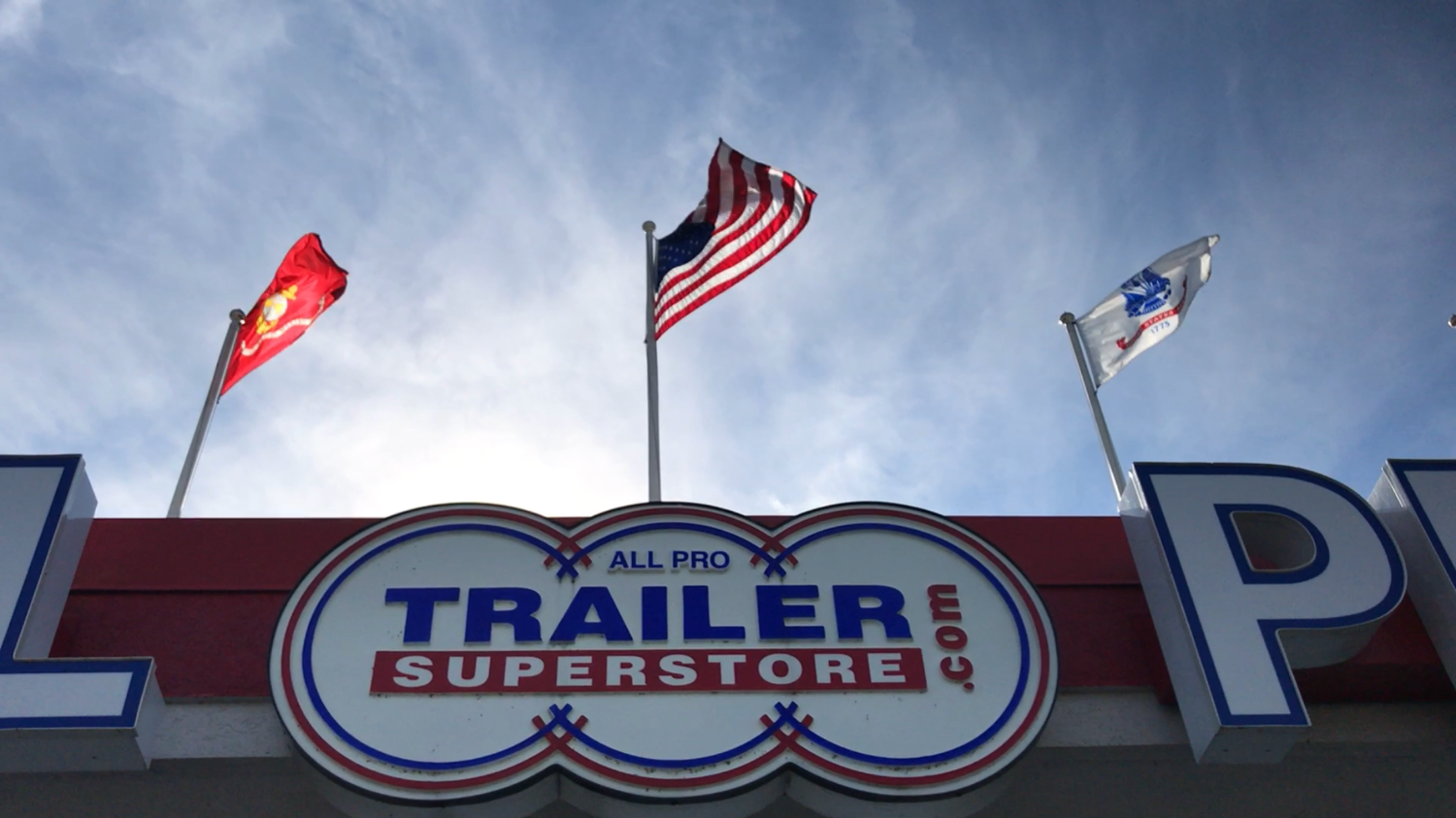Deckover Trailer Buyers Guide
Sep 12, 2024Last Updated on September 30, 2024 by David Miller
Last Updated on September 30, 2024 by allprotrailersuperstore
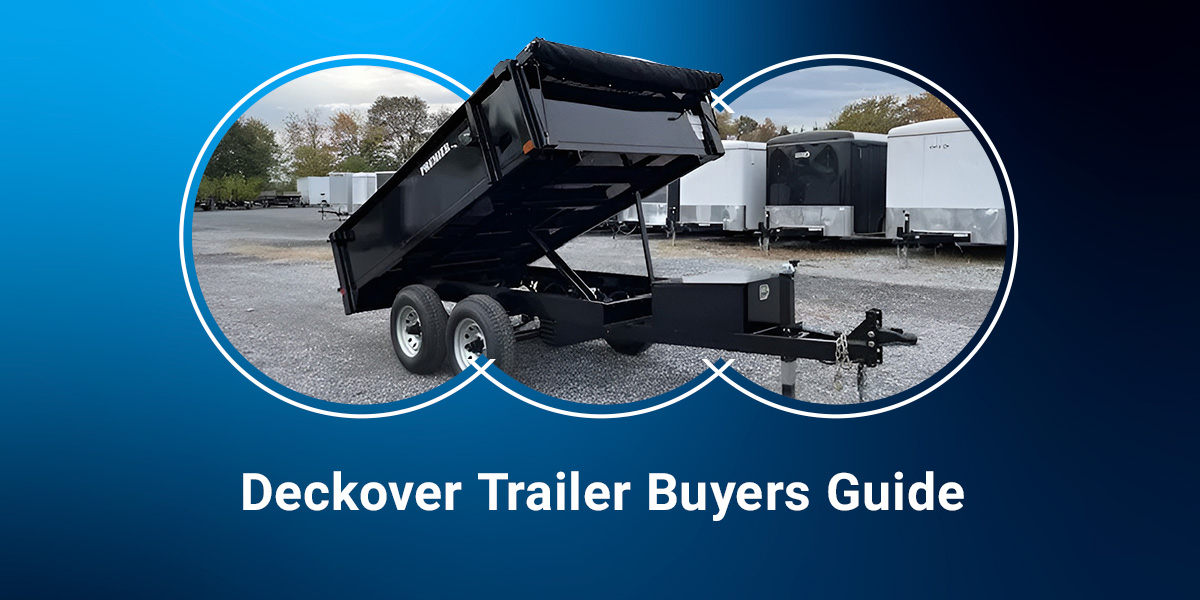
Hauling heavy equipment and material loads is safe and easy with a heavy-duty deckover trailer. This type of trailer is popular for its flat deck that rests on top of its wheels instead of between them, maximizing surface area.
Thanks to a deckover trailer’s increased space, you can load and unload objects faster, carry bulkier or oversized equipment, and boost overall efficiency. Choosing the right type of trailer ensures your equipment will fit on the trailer, prevents you from exceeding weight capacities and enables you to haul loads safely.
Table of Contents
- What Is a Deckover Trailer?
- Deckover vs. Standard Equipment Trailers
- Types of Deckover Trailers
- How to Choose the Right Type of Deckover Trailer
- Top Deckover Trailer Brands
- Common Accessories for Deckover Trailers
- Towing a Deckover Trailer Safely
- Shop High-Quality Deckover Trailers Online
What Is a Deckover Trailer?
A deckover trailer features a deck that rests above its wheels, providing ample surface area for hauling equipment or materials. With an open-top cargo area containing no ceiling, deckover trailers are versatile and offer the following advantages:
- Greater ground clearance: Since a deckover trailer’s deck sits above the wheels, it has a high ground clearance that prevents the hitch from hitting the ground or obstacles such as steep driveways and curbs. This heightened ground clearance makes it easier to transport equipment or materials safely while driving over rough terrain.
- More loading space: A deckover trailer offers maximum loading space so you can easily fit your larger equipment or material loads.
- Increased payload capacity: A deckover trailer’s deck can extend beyond its wheels to maximize the payload capacity, enabling you to transport heavier loads than you could with other trailers.
- Easier trailer access: It’s easy to access a deckover trailer’s sides since the wheels are under the deck and out of the way.
- Greater efficiency: A deckover trailer’s design enables you to load and unload materials and equipment faster, helping you complete tasks faster and boost overall efficiency.
Deckover vs. Standard Equipment Trailers
When comparing a deckover vs. a car hauler or standard equipment trailer, the main difference is in the design. A standard flatbed equipment trailer’s deck rests between its wheels, so it sits lower to the ground and has a smaller surface area for equipment. While a standard equipment trailer can handle small pieces of equipment such as cars and ATVs, a deckover trailer can haul larger, bulkier loads or equipment that exceeds a 6-foot width.
A deckover trailer’s larger loading surface area also makes it easier to load materials using a forklift because it provides more clearance. If you need to load pallets or lumber, a deckover trailer gives you more space to move around and place items on the deck since its wheels and fenders are beneath it.
A deckover trailer also has an advantage over standard equipment trailers when it comes to terrain. Since a standard flatbed trailer has a lower ground clearance, you can only load and tow it on flat surfaces. A deckover trailer’s higher ground clearance enables you to load and haul on flat or rough terrain, making it easier to handle your equipment in various locations. It’s also important to note that deckover trailers require longer loading ramps than standard trailers due to the difference in ground clearance.
Types of Deckover Trailers
Different types of deckover trailers are available to meet various needs and applications.
Deckover Equipment Trailers
Deckover equipment trailers are ideal for hauling heavy equipment and vehicles such as:
- Tractors
- Excavators
- Skid steers
- Backhoes
- Forklifts
- Shredders and chippers
- Garden tillers
- Compactors
- Pavers
- Asphalt rollers
- Compressors
- Generators
- Cars
- Golf carts
- Large mower decks
- Boats
- Large campers and RVs
- Small shipping containers
- Plows, harrows and hay balers
You can also use a deckover equipment trailer to haul items and materials such as pallets, straw bales, drywall and plywood. When you purchase a deckover equipment trailer, you can choose from the following types of ramps:
- Slide-out: A slide-out ramp extends from a deckover trailer, which is convenient if you use your trailer frequently.
- Split landscape: A split landscape ramp spans a deckover trailer’s entire rear, and you can spring-assist it for additional functionality. Many users find spring-assisted split landscape ramps easy to flip up, making loading and unloading easier. This type of ramp also helps prevent equipment and items such as hay bales from rolling off your trailer.
- Ladder: Ladder ramps are sturdy options that are easy to use and stow. A ladder ramp attaches to a deckover trailer in two separate pieces, each one resembling a ladder with a gradual slope. Ladder ramps are typically made of steel or aluminum to support heavy equipment as you drive or push it onto the deck.
Gooseneck Deckover Equipment Trailers
A gooseneck deckover trailer is similar to the deckover equipment trailer, but it features a gooseneck hitch. This type of hitch connects a trailer to your towing vehicle more securely and enables you to make tighter turns. A gooseneck deckover trailer also tends to have greater ground clearance, longer length, enhanced stability and higher weight capacity than the standard deckover equipment trailer.
Deckover Dump Trailers
Deckover dump trailers feature sides, enabling you to haul heavy loose materials such as dirt, sand, stones, debris and gravel. A deckover dump trailer often features a spreader gate, which opens from the bottom and allows you to dump material under the gate.
How to Choose the Right Type of Deckover Trailer
Choosing the right type of deckover trailer ensures it meets your specific application and needs. Consider the following factors before investing in your next trailer:
Equipment or Materials You Need to Haul
What type of equipment or materials do you need to haul? If you plan to transport loose materials such as dirt, gravel or sand, you will need a deckover dump trailer. If you haul equipment such as excavators, tractors and skid steers, you will need a deckover equipment trailer.
Trailer Dimensions
It is also essential to choose the right trailer based on your equipment dimensions. Before purchasing a trailer, ensure you can safely and easily fit your equipment on it. Deckover trailer widths typically range between 6 and 8 feet, giving you plenty of options to meet your needs.
Consider your bulkiest load’s dimensions and your state’s overhang guidelines. Ensure your equipment will not exceed overhang rules to ensure compliance with driving and towing regulations.
Weight Capacity and Distribution
Weight capacity is the maximum weight a trailer can hold safely, and it’s one of the most important considerations when choosing a deckover trailer. Base your decision on the heaviest load you plan to carry, and choose a trailer with a weight capacity that exceeds it.
Safe weight distribution prevents your trailer from tipping loads during transit. If you expect to haul extra heavy loads, opt for a dual- or tandem-axle trailer. A dual-axle trailer features two sets of wheels, and the second axle rests directly behind the first. This trailer design results in enhanced weight distribution, load capacity and stability for safer, extra-reliable towing.
Towing Capacity
Your vehicle must be able to handle the weight of your trailer and loads. Check your towing vehicle’s capacity, and ensure the sum of your trailer and load weight can remain within this capacity.
Trailer Material
Your trailer’s frame material can affect its durability and longevity. Steel is heavy but durable, and an aluminum deckover trailer is lightweight and rust-resistant.
Hitch Type
Check your vehicle’s hitch type before choosing a trailer. The hitch determines the type of deckover trailer your vehicle can support, so you should check which of the following you have before purchasing a trailer:
- Gooseneck hitch: You can mount a gooseneck hitch in your truck bed, which attaches to the frame via a ball-and-coupler system. Consider adding a gooseneck hitch if you have a heavy-duty vehicle and plan to tow heavy loads.
- Bumper pull: A bumper pull hitch is similar to a gooseneck hitch but mounts on the back of your towing vehicle. This type of hitch can support a deckover equipment trailer, but you can accommodate heavier loads by fitting it with a gooseneck adapter hitch.
- Pintle: A pintle hitch is a heavy-duty rear-frame hitch for towing vehicles that can’t fit a gooseneck hitch.
Maneuverability
Consider where you plan to haul loads. If your typical route consists of narrow roads and tight turns, a shorter deckover trailer or a gooseneck deckover trailer is ideal. Choosing a shorter trailer or one with a gooseneck hitch enables you to maneuver sharp corners more effectively.
Budget
Create your budget before searching for a deckover trailer. If the model you want is out of your price range, you can look into helpful financing options or consider purchasing a preowned trailer to reduce your upfront cost. Preowned trailers are durable, reliable options priced more affordably than brand-new trailers, helping you get excellent value while staying within your budget.
Top Deckover Trailer Brands
Trailers from reputable brands offer greater durability and longevity. Some of the top deckover trailer manufacturers are:
Big Tex
Big Tex manufactures deckover trailers with a strong dedication to durability, longevity, safety and ease of use. A Big Tex deckover trailer can withstand heavy use and requires minimal maintenance. It also includes features such as step rails, a hydraulic lift system, electric brakes, an outer rub rail and a slip spring suspension for enhanced safety and easy loading and unloading.
Premier Trailers
Premier Trailers manufactures some of the industry’s best deckover trailers. These durable options come with standard features such as pressure-treated wood floors, EZ Lube axles, all wheel electric brakes, adjustable couplers and fold-down ladder ramps with support legs.
CAM Superline
CAM Superline manufactures exceptional deckover trailers in gooseneck and bumper pull variations. These heavy-duty trailers come with excellent standard features such as PPG paint, I-beam frames and pressure-treated decking.
BWise
BWise deckover trailers are heavy-duty options to handle your heaviest, most demanding hauling needs. A BWise deckover trailer can accommodate light to heavy-duty loads. Similar to CAM Superline, some BWise trailers also come with features such as I-beam frames and pressure-treated decking.
Common Accessories for Deckover Trailers
Deckover trailers are versatile because you can enhance them with helpful accessories. Consider adding the following types of accessories to your trailer for greater convenience and capabilities:
- Toolboxes
- Additional lighting
- Spare tire mounts
- Retractable steps
- Trailer tarps
- Trailer jacks
- Wood finish such as APITONG oil for moisture protection
Towing a Deckover Trailer Safely
Each state sets and enforces its own driving regulations for deckover trailers, but the following are standard rules everyone must follow to ensure safe towing:
- Driving in the right lane: Driving in the right lane while towing a trailer is necessary unless you’re passing another vehicle.
- Longer stopping distances: Towing extra weight slows your stopping time, so you must leave longer stopping distances between you and the vehicles or points in front of you.
- Overhang: The United States Department of Transportation (DOT) establishes minimum trailer overhang guidelines, but your state may have specific overhang rules. For example, the DOT sets legal minimum trailer overhangs at 4 feet in the back of the trailer and 3 feet in the front, but some states allow extended overhangs for equipment that is challenging to shorten or disassemble.
- Additional mirrors: Your towing vehicle may require additional mirrors on both sides if the trailer or load blocks your vision.
- Brake adjustment: You should adjust your trailer brakes based on each load’s weight. It’s also important to use the trailer’s brakes instead of your towing vehicle’s brakes any time you travel downhill.
- Red flags: Many states require red flags to indicate oversized loads, letting other drivers know that the load extends beyond the towing vehicles.
- Cargo: Securing cargo prevents objects from rolling onto the road and disrupting traffic. Tying your equipment or materials down with straps, netting or rope keeps it in place during transport.
- Safe backing up: Using a spotter when backing a trailer up is essential to prevent accidents.
- User manual: Always refer to a new trailer’s user manual before towing it. The user manual provides all of the important information you need to tow your trailer safely.
- Maintenance: Proper maintenance is key to safe towing and trailer longevity. Ensure your trailer’s lights are in working condition each time you tow it, and perform regular inspections and maintenance according to the user manual’s recommendations.
Shop High-Quality Deckover Trailers
Deckover trailers are excellent equipment for hauling your heaviest, bulkiest loads. From equipment such as ATVs, cars and excavators to heavy material such as sand and gravel, you can depend on a deckover trailer to handle your loads safely.
As one of the nation’s top full-service trailer providers, All Pro Trailer Superstore is proud to provide dependable trailers, maintenance, repair services, inspections and customizations. We offer a wide selection of deckover trailers to meet your unique equipment hauling or dumping applications, and our experts can help you select the perfect one for your needs.
Our team can also help you find financing options if necessary, handle your title and tagging needs, and inspect your trailer before you take it home. At All Pro Trailer Superstore, we are passionate about providing you with a trailer that meets your hauling application, needs and budget. Contact us to learn more about what we have to offer and find your ideal deckover trailer.


